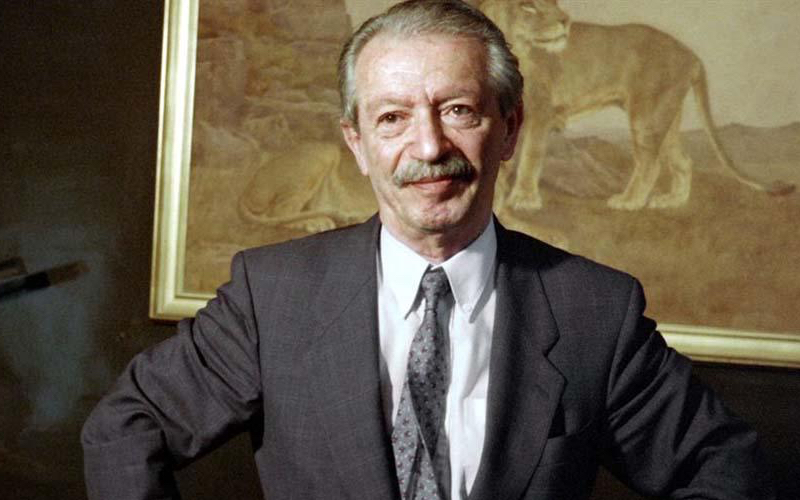
Shapour Bakhtiar and the Liberal Dilemma in the Middle East
“I am a supporter of social democracy since in Iran, where the dissatisfactions stem from social injustice, it is not possible to only rely on having a moderate government. The circumstances force us to be leftist, but I repeat again that the social democracy suitable for us cannot be exactly the same as the social democracy prevailing in Federal Republic of Germany or Sweden. The nature of social democracy of a system is ahead through which social justice, along with industrial development, will be established without revolution and without conflicts and prejudice, tailored with the traditions and culture of the country where this disposition is rooted. Social democracy must be taught to Iranians, which is a long-term process,” Shapour Bakhtiar, the last prime minister of the Pahlavi dynasty.
Shapour Bakhtiar became prime minister when the Pahlavi dynasty was about to collapse and his term lasted for 37 days. He studied in France and joined the National Resistance Movement in France during World War II. Although he referenced social democracy in his speeches in order to attract leftists in Iran, he was liberal in terms of politics and culture. One of his actions was to put an end to Iran’s Intelligence and Security Organization (SAVAK), whose acts of violence were criticized by the opponents of the Pahlavi dynasty. Furthermore, Bakhtiar issued an order to release all political prisoners and eliminate censorship of the press.
Bakhtiar believed in secularism. His doctoral thesis was also about the relationship of religion and political power in traditional communities (separation of religion and politics). Bakhtiar believed that Shiite clergymen must refrain from politics and only address religious activities. He was willing to turn Qom City into a Shiite Vatican, so that the clergymen could discuss religion there. However, most Iranians rejected him in 1979 and supported Ayatollah Khomeini and the Islamists.
In recent years another liberal in the Middle East, Mohamed ElBaradei, the former head of the International Atomic Energy Agency suffered a similar rejection in Egypt. He returned to Egypt in 2010 and supported a movement which consisted of democrats and liberals to overthrow Mubarak, the former Egyptian President. After the fall of Mubarak and Morsi’s victory, he also asked Morsi to step down from power in order to maintain “national unity.” However, the Islamist groups and a group of secular opponents accused him of being connected to the corruption in Mubarak’s inner circle because he had lived outside Egypt for many years.
The failure of liberal politicians like ElBaradei and Bakhtiar raises a question. Why do liberals always fail in the Middle East?
There are a number of reasons. First, the role of religion is still important to people in the Middle East. Some believe that there is no conflict between Islam and liberalism and reference a verse of the Quran which says that there is no force in Islam. On the contrary, the opponents believe that Islam basically cannot compromise with liberalism. They argue that the foundation of liberalism is based on tolerance and compromising with others as long as the “other” doesn’t take away my freedom, while Islam is a mission itself, just like any other religion, which directs people to the right path. In the context of religious discourse, the “other” is categorized into hypocrites, heretics and infidels. The fact is that Islam and liberalism are in conflict with each other in the areas of equality between men and women, the rights of religious minorities and the LGBT communities because these issues are non-negotiable from a Muslim’s perspective.
There is some evidence to verify the argument made by those who believe in the conflict between Islam and liberalism. For example, during his insurgent campaign for president, former Brotherhood leader Abdel Moneim Abul Futouh explained it this way to a Salafi television channel: “Today those who call themselves liberals or leftists, this is just a political name, but most of them understand and respect Islamic values. They support the sharia and are no longer against it.” In a creative attempt at redefinition, Abul Futouh noted that all Muslims are, by definition, Salafi, in the sense that they are loyal to the Salaf, the earliest, most pious generations of Muslims. He seemed to be saying: We are all, in effect, Islamists, so why fight over it?”
The second point is that historical experience has shown that in the context of democracy, the Islamists only accept the mechanism of election and empowering through the ballot box. However, they never accepted relinquishing power based on election mechanisms in other regions in the Middle East (except the Ennahda Party in Tunisia).
Another point which is worth mentioning is the question of compatibility between democracy and Islam. In fact, the Islamist theorists have shown that they don’t believe in the equality of citizens, which is the basic principle of liberal democracy. For example, Abu al-A’la al-Mawdudi’s concept of a “theo-democracy” states three principles: tawhid (unity of God), risala (prophethood) and khilafa (caliphate) underlie the Islamic political system. Mawdudi argues that any Islamic polity has to accept the supremacy of Islamic law over all aspects of political and religious life—hardly a democratic concept given that Islamic law does not provide for equality of all citizens under the law regardless of religion and gender.
Another point is that the liberals have never had a forum that expresses their opinions. After the end of the colonial era in the Middle East, secular dictatorships came to power and began to suppress liberals and leftists. Meanwhile, they also monopolized the media. The only group which was able to reach people were Islamist groups through a system of mosques. During the Iranian Revolution, the Islamists also delivered Ayatollah Khomeini’s speeches using cassettes recorded by his voice. The Islamists have always told people that liberalism is Western and anti-religious. Therefore, a wrong and falsified perception of both liberalism and secularism has always prevailed among people in the Middle East.
The Arab Spring in the Middle East created hope that the situation in the region will change from the Islamism and militarism bipartite to democracy. However, both in Turkey which is governed under Erdogan’s Islamist authoritarianism or in Egypt which is under the governance of Sisi and the military, this hope wasn’t realized. Maybe we have to pay more attention to the words of Fareed Zakaria, “Democratization might even lead to violence if it is not based on liberal ideas. Democratization without liberalism is dangerous and results in authoritarianism and illegality.”
There must be a balance between democracy and freedom. But is such a balance possible in the Middle East? Not thus far!

